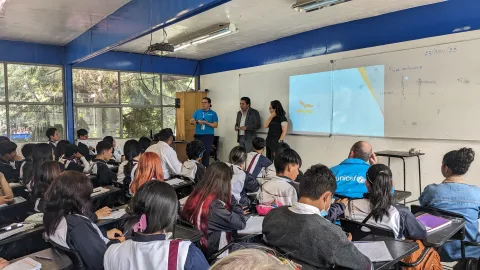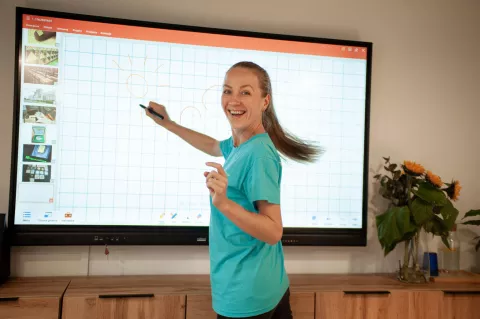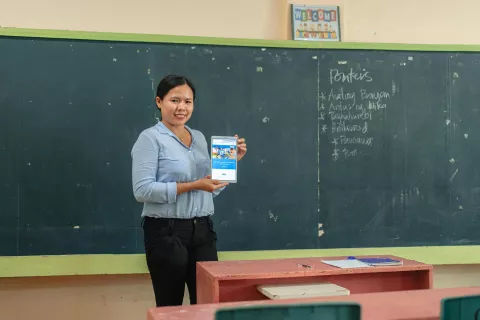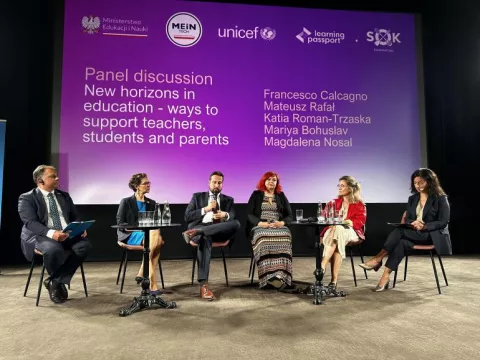Zimbabwe's Learning Passport Case Study
Transforming learning for children through the Learning Passport
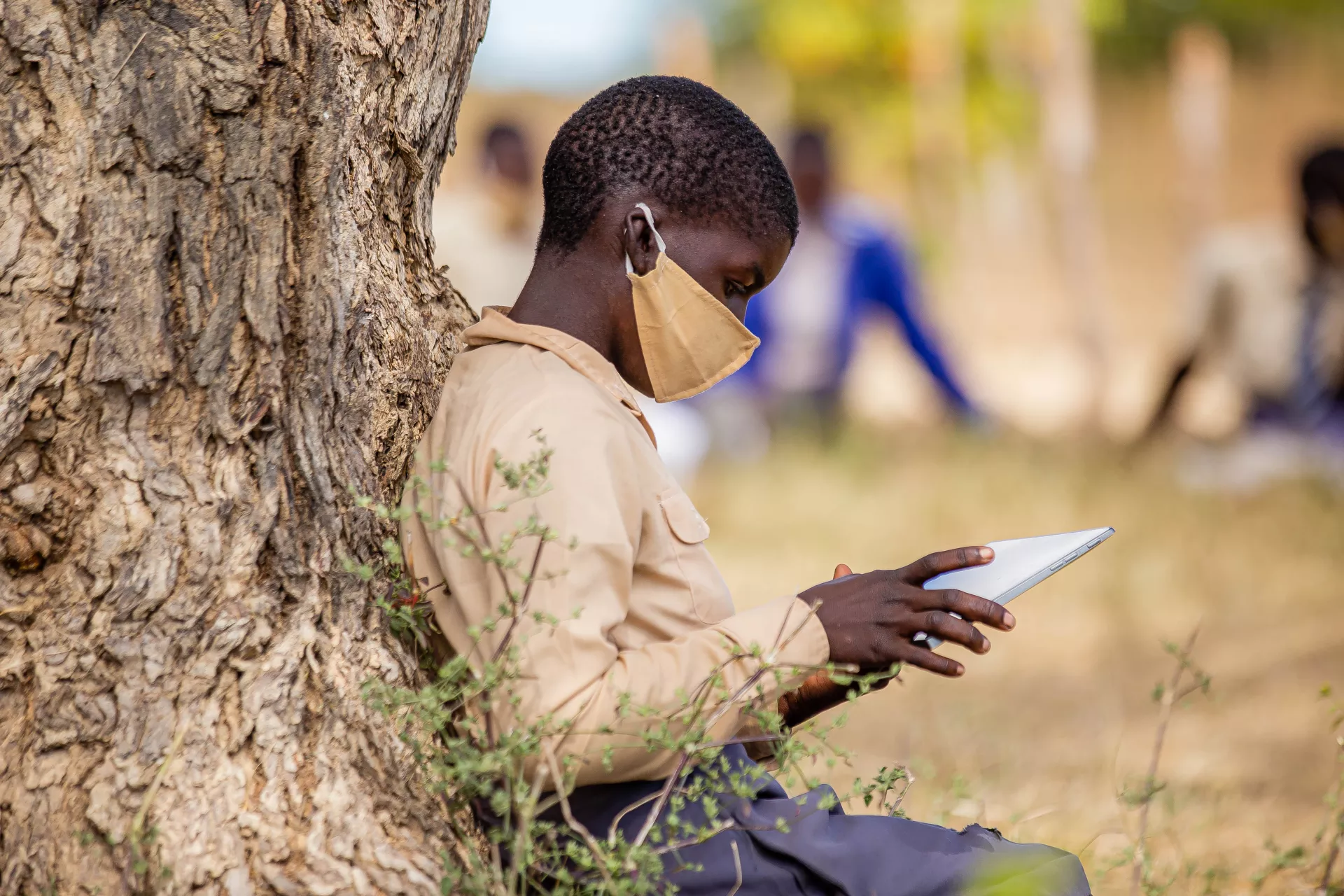
Since the onset of the COVID-19 pandemic at the beginning of 2020, governments globally and in Africa closed schools fully or partially as one of various public health and social measures intended to curb COVID-19. In Zimbabwe, the school closure in March 2020 affected over 5 million learners. Since then, schools were partially opened, closed, and then fully opened throughout 2020-2021. The Ministry of Education ensured continuity of learning by following a blended approach where students continue learning via Radio, online lessons, and face-to-face learning where schools are open for face-to-face learning. The radio lessons proved to be efficient in a country like Zimbabwe where the poverty gap is very high and connectivity is poor in marginalized communities (with only about 31% of schools in Zimbabwe are connected to the internet). But the radio lessons do not have the capability for learners to have an online service where they could access the radio lessons later and play them again if they needed to.
To overcome these challenges and accelerate UNICEF mandate of transforming societies through education, a new and free digital learning platform called Zimbabwe Learning Passport is designed and launched on March 11, 2021. The Learning Passport improves the education of learners in the country who face barriers to learning because of poverty, discrimination, conflict, and disaster such as the COVID-19 pandemic. Zimbabwe is the second country, after Puntland, Somalia, in Eastern Southern Africa Region (ESAR) to launch the Learning Passport.
The Learning Passport (LP) promotes continuous learning during and after the COVID-19 pandemic by offering high-quality, flexible learning that includes skills development courses for all Children, Youth, and Teachers. Most of the e-Learning platforms in Zimbabwe are commercial/owned by private players, Learning Passport is the first digital content owned and managed by the Ministry of Primary and Secondary Education (MoPSE) and is available for learners and stakeholders for free. The Learning Passport bridges the gap between those who can afford paid e-Learning platforms and those who can’t. Learners and Teachers have access to both local and global open content.
The Zimbabwe Learning Passport provides learners, in both formal and non-formal education, access to learning resources. The platform hosts Radio Lessons, Syllabuses, Teacher Guides/resources, and Learning Modules (audio lessons, online books, videos, and interactive content). Local and global digital content were identified by UNICEF teams and their stakeholders and were approved by MoPSE and the UNICEF Learning Passport Working group.
Results
- Zimbabwe launched the Learning Passport with high-level presence from the Government of Zimbabwe, Hon Cain Mathema - Minister of Primary and Secondary Education, Hon Jenfan Muswere - Minister of ICT, Postal and Courier Services, Mukudzeishe Madzivire - Zimbababwe Junior President, Henrietta H. Fore - UNICEF Executive Director, Laylee Moshiri and Kate Behncken-Vice President and Lead of Microsoft Philanthropies.
- The launch was aired on multiple local media including ZBC TV, Radio and more than 7000 people followed the live event on https://www.facebook.com/watch/live/?v=263315515452760&ref=watch_permalink.
- Mobile Application of the LP released at the launch
- 70,000 users, 25%of the 300,000 targets for the year 2021 registered in the first week of the launch
- The LP Platform can be accessed online or via an Android mobile application and it hosts over 1000 Radio Lessons, Syllabuses, Teacher Guides, Learning Modules, and Teacher Resources.
- UNICEF with its advocacy efforts to promote the increased use of the Zimbabwe Learning Passport reached 2000 learners and 104 teachers in two schools and has registered 71,296 users.
Lessons Learned
- Building on existing Infrastructure: The high coverage of mobile phone penetration in Zimbabwe (89.4%, DHS 2019) facilitated the platform to be accessed by learners and teachers using smartphones. In addition, the GIGA project recently initiated in the country which aims at connecting every young person and every school to the internet will greatly improve connectivity, which in turn alleviates the connectivity issue the country is facing.
- Strong Collaboration and Engagement by all Stakeholders: Strong collaboration between the Zimbabwe Government through MoPSE and Ministry of ICT, UNICEF CO (Education, Communications, and ICT section), a private company called ECONET, which offered its e-learning platform to all learners free of charge and UNESCO, which assisted the ministry to develop a resource portal for teachers helped to ensure the quality of content, alignment and sustainability.
- Improve Digital Literacy Skills: The new curriculum supports improvement towards the skills needed for the 21st century such as digital literacy skills of learners focusing on parents and Early Childhood Education. Training teachers on LP will also circuitously improve the lack of digital literacy skills by the majority of teachers in the country.
- Effective Communication Campaigns: Communication campaigns including Social Media Pack and Video aiming at channeling the power of digital learning with strong visibility and promotional campaigns produced.
- Implement offline version of the LP: To overcome the challenge of poor connectivity, especially in the rural parts of the country in which learners and teachers connect via mobile phones, an offline version is being developed to be accessed by the most marginalized.
- Community of Practice (CoP): CoP created for teachers and content developers to facilitate engagement, share experience and knowledge.
- Alignment with Local and Global Agendas: a strong alignment with local and global agendas on ICT in Education
Next Steps
UNICEF will continue to support the MoPSE to institutionalize the Learning Passport including scaling up to every school, capacity building, strengthen smart partnerships with (Mobile Network Operators (zero-rating), Co-Branding through SMS/Emails and Locally driven content sharing arrangements), continue the promotion and visibility campaigns through school visits and media.
